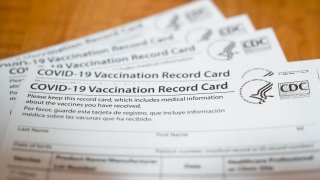
President Joe Biden said that 90% of adults in the U.S. will be eligible for Covid-19 shots by April 19 and will be able to get them within five miles of their home, during a press conference Monday.
There are currently three vaccines that have been authorized for emergency use from drugmakers Moderna, Pfizer-BioNTech and Johnson & Johnson.
Experts say you should take whichever vaccine is available to you.
"The point of vaccinations is to get as many people vaccinated as we can as quickly as we can, because that's going to help the virus stop transmitting between people," Lisa Lee, an infectious disease epidemiologist and a public health ethicist at Virginia Tech, tells CNBC Make It. "When we stop transmitting between people, we also stop the opportunity for mutation."
Get top local stories in Southern California delivered to you every morning. Sign up for NBC LA's News Headlines newsletter.
At this stage, it's impossible to make head-to-head comparisons between the three vaccines, because they haven't been tested against each other in a clinical trial. The three trials for the authorized vaccines took place at different points in time, in different parts of the world and with different populations.
Here's what we know about the different vaccines so far:
Johnson & Johnson
Money Report
How it works: Johnson & Johnson's vaccine utilizes adenoviruses, a type of virus that causes the common cold, as a vehicle to deliver instructions to cells about how to fight the virus. When injected into the arm, the adenovirus can't replicate or cause illness, but it does create antibodies.
Number of doses required: One. This single-dose vaccine only requires basic refrigeration for storage, and has a longer shelf-life.
Effectiveness: Johnson & Johnson announced Jan. 29 that the vaccine was 66% effective overall in protecting against Covid-19, and 85% effective in preventing severe disease which includes illnesses requiring hospitalization. In the United States, the vaccine provided a 72% level of protection against moderate to severe Covid-19 infection. But in South Africa, where a highly contagious mutation of the virus is the primary variant, the effectiveness was only 57%.
How long it takes to build immunity: In general, it takes a few weeks to build immunity after vaccination, according to the CDC. In clinical trials, protection started as early as 14 days after the vaccination.
Availability: Johnson & Johnson received authorization for emergency use from the Food and Drug Administration on Feb. 27. The company expects to have 20 million doses delivered by the end of March, and 100 million during the first half of 2021.
Novavax
How it works: Novavax's Covid vaccine is a "protein subunit vaccine," which contains harmless pieces of the surface spike protein that the coronavirus uses to infect humans. When the body's immune system recognizes the proteins, it starts making antibodies, and can remember how to fight the virus if infected in the future, according to the Centers for Disease Control.
Number of doses required: Two doses, one month apart. The vaccine only requires basic refrigeration.
Effectiveness: Novavax said Jan. 28 that its vaccine was more than 89% effective in protecting against Covid-19 in its phase three clinical trial conducted in the United Kingdom, but less than 50% effective against the troubling strain from South Africa.
How long it takes to build immunity: Vaccine efficacy in the U.K. trials was 89% seven days after the second dose.
Availability: Novavax was paid $1.6 billion as part of Operation Warp Speed this summer, with the goal of delivering 100 million doses by the beginning of 2021. A late-stage trial in the U.S. and Mexico started in late December, so it's not clear at the moment when the vaccine will get authorized for use in the U.S.
Moderna
How it works: Moderna utilizes an innovative vaccine technology called messenger RNA, or mRNA. Messenger RNA is genetic material that, when injected, gives cells instructions on how to make a non-infectious piece of the virus' spike protein. Once the immune system detects the copies of the spike protein, it creates antibodies against it. The body can then remember how to trigger an immune response and create antibodies that fight the virus if infected in the future.
Number of doses required: Two doses given 28 days apart. Because of the mRNA technology, the Moderna vaccine has to be shipped at extremely cold temperatures and must be stored at specific refrigerated temperatures.
Effectiveness: The Moderna vaccine has been shown to have an efficacy of 94.1%. It also appears to provide protection against the new variants, but is more effective on the U.K. variant than the one from South Africa. The company announced Jan. 25 that it is working on a vaccine booster to address new variants, which should be available by fall. (Adjusting for new strains is a manageable, relatively quick undertaking thanks to the way mRNA vaccine technology works.)
A recent study from the CDC found that a single dose of Moderna or Pfizer-BioNTech's vaccines was 80% effective in preventing coronavirus infections in real-world conditions.
How long it takes to build immunity: In clinical trials, one dose of the Moderna vaccine was 80.2% effective a month after vaccination. Two doses brought efficacy up to 95.6%.
Availability: Moderna's vaccine was approved by the FDA for emergency use on Dec. 18. The company said it's working to produce up to 1 billion doses of its Covid vaccine this year.
Pfizer-BioNTech
How it works: Pfizer's vaccine uses the same mechanism as Moderna's, as it is also based on mRNA technology.
Number of doses required: Two doses given 21 days apart. The Pfizer vaccine also has to be stored in an ultra-cold freezer.
Effectiveness: The Pfizer vaccine was 95% effective at preventing laboratory-confirmed Covid-19 illness in people without evidence of previous infection. Pfizer told CNBC Thursday that their vaccine was still effective against lab-engineered mutations that are seen in the new variants found in the U.K. and South Africa.
Pfizer said Wednesday that its Covid vaccine was 100% effective in adolescents between the ages of 12 and 15, and the drugmaker will request an amendment to its emergency use authorization.
How long it takes to build immunity: Starting 12 days after the first dose, the Pfizer vaccine is 52% effective, and 95% effective after two doses, according to data published in December.
Availability: Pfizer's vaccine was approved for emergency use on Dec. 11. The company expects to deliver 200 million doses by July. President Joe Biden said Jan. 26 that the government plans to purchase 100 million more doses from both Pfizer and Moderna.
Oxford-AstraZeneca
How it works: The Oxford-AstraZeneca vaccine also uses adenoviruses to carry SARS-Cov-2 genes into cells.
Number of doses required: Two doses, three months apart.
Effectiveness: Data from large trials released in November found that the vaccine was 62% effective, but there were issues with that study. Another study published Sunday found that the vaccine only offers "minimal protection" against mild to moderate disease caused by the South African coronavirus variant.
How long it takes to build immunity: People are protected starting 22 days after the first dose, according to preprint data released on Feb. 3. The Oxford-AstraZeneca vaccine was 76% effective 22 days after the first dose, and 82.4% effective after the second.
Availability: AstraZeneca hasn't applied for emergency use authorization in the U.S. yet. Britain gave the Oxford-AstraZeneca vaccine emergency use authorization on Dec. 30, and India also granted emergency use on Jan. 3. South Africa suspended the use of the Oxford-AstraZeneca vaccine Feb. 7, after data suggests it doesn't work on the country's variant.
To check your eligibility status, you can use NBC News' plan your vaccine tool.
This story has been updated to include information about Johnson & Johnson's vaccine gaining emergency use authorization, to include NBC's vaccine tool as well as updates on vaccine effectiveness and expert advice.
Check out: How scientists can ‘copy and paste’ Covid vaccines to work on the strain from South Africa
Don't miss: The best credit cards for building credit of 2021






